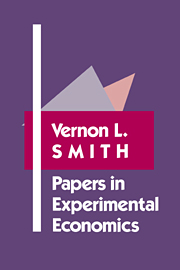Book contents
- Frontmatter
- Contents
- Preface
- Acknowledgments
- Part I The Formative Years
- Part II Institutions and Market Performance
- Introduction
- 10 On Nonbinding Price Controls in a Competitive Market
- 11 An Experimental Comparison of Alternative Rules for Competitive Market Exchange
- 12 Competitive Market Institutions: Double Auctions vs. Sealed Bid-Offer Auctions
- 13 Markets as Economizers of Information: Experimental Examination of the “Hayek Hypothesis”
- 14 The Effect of Rent Asymmetries in Experimental Auction Markets
- 15 Microeconomic Systems as an Experimental Science
- 16 Experimental Economics (Reply to R. Heiner)
- 17 A Comparison of Posted-Offer and Double-Auction Pricing Institutions
- 18 Hypothetical Valuations and Preference Reversals in the Context of Asset Trading
- 19 Bubbles, Crashes, and Endogenous Expectations in Experimental Spot Asset Markets
- Part III Public Goods
- Part IV Auctions and Institutional Design
- PART V Industrial Organization
- Part VI Perspectives on Economics
15 - Microeconomic Systems as an Experimental Science
Published online by Cambridge University Press: 06 July 2010
- Frontmatter
- Contents
- Preface
- Acknowledgments
- Part I The Formative Years
- Part II Institutions and Market Performance
- Introduction
- 10 On Nonbinding Price Controls in a Competitive Market
- 11 An Experimental Comparison of Alternative Rules for Competitive Market Exchange
- 12 Competitive Market Institutions: Double Auctions vs. Sealed Bid-Offer Auctions
- 13 Markets as Economizers of Information: Experimental Examination of the “Hayek Hypothesis”
- 14 The Effect of Rent Asymmetries in Experimental Auction Markets
- 15 Microeconomic Systems as an Experimental Science
- 16 Experimental Economics (Reply to R. Heiner)
- 17 A Comparison of Posted-Offer and Double-Auction Pricing Institutions
- 18 Hypothetical Valuations and Preference Reversals in the Context of Asset Trading
- 19 Bubbles, Crashes, and Endogenous Expectations in Experimental Spot Asset Markets
- Part III Public Goods
- Part IV Auctions and Institutional Design
- PART V Industrial Organization
- Part VI Perspectives on Economics
Summary
Study nature, not books…
Louis AgassizAfter studying economics for six years I have reached the conclusion that there is no difference between discovery and creation…
[Graffiti by an unknown student]The experimental literature contains only a few attempts to articulate a “theory” of laboratory experiments in economics (Charles Plott, 1979; Louis Wilde, 1980; my articles, 1976a, pp. 43–44, 46–47; 1976b; 1980). It is appropriate for this effort to have been modest, since it has been more important for experimentalists to present a rich variety of examples of their work than abstract explanations of why one might perform experiments. Wilde's contribution provides an integration and extension of the earlier papers, and brings a fresh perspective and coherence that invites further examination. This seems to be the time and place to attempt a more complete description of the methodology and function of experiments in microeconomics.
The formal study of information systems in resource allocation theory (Leonid Hurwicz, 1960) and the laboratory experimental study of resource allocation under alternative forms of market organization (Sidney Siegel and Lawrence Fouraker, 1960, Fouraker and Siegel, 1963; my 1962, 1964 articles) had coincident beginnings and, in important respects, have undergone similar, if mostly independent, intellectual developments. The similarity of intellectual development in these two new endeavors is represented by the increasing focus upon the role of institutions in defining the information and incentive structure within which economic outcomes are determined.
- Type
- Chapter
- Information
- Papers in Experimental Economics , pp. 254 - 286Publisher: Cambridge University PressPrint publication year: 1991
- 81
- Cited by



